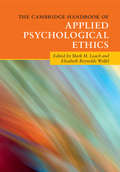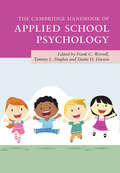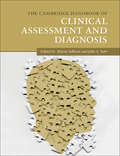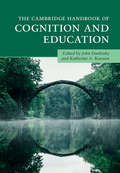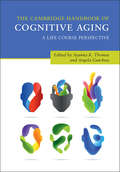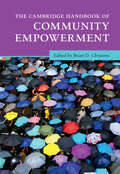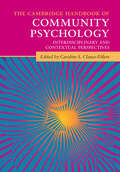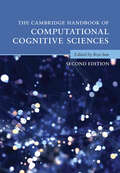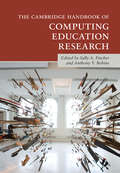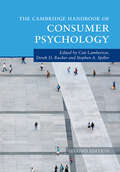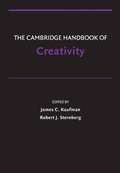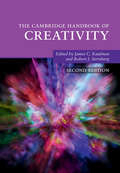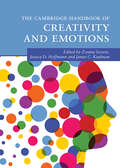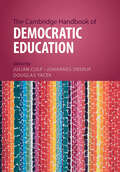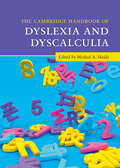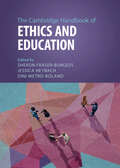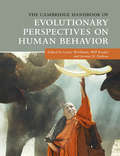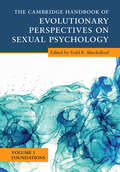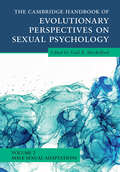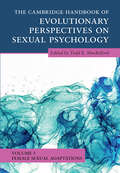- Table View
- List View
The Cambridge Handbook of Applied Psychological Ethics (Cambridge Handbooks in Psychology)
by Mark M. Leach Elizabeth Reynolds WelfelThe Cambridge Handbook of Applied Psychological Ethics is a valuable resource for psychologists and graduate students hoping to further develop their ethical decision making beyond more introductory ethics texts.<P><P> The book offers real-world ethical vignettes and considerations. Chapters cover a wide range of practice settings, populations, and topics, and are written by scholars in these settings. Chapters focus on the application of ethics to the ethical dilemmas in which mental health and other psychology professionals sometimes find themselves. Each chapter introduces a setting and gives readers a brief understanding of some of the potential ethical issues at hand, before delving deeper into the multiple ethical issues that must be addressed and the ethical principles and standards involved. No other book on the market captures the breadth of ethical issues found in daily practice and focuses entirely on applied ethics in psychology.<P> The first handbook to focus entirely on applied ethics in psychology.<P>Includes real-world, complex ethics cases across a variety of practice settings, populations, and topics.<P>Builds on an introductory knowledge of ethics.
The Cambridge Handbook of Applied School Psychology (Cambridge Handbooks in Psychology)
by Tammy L. Hughes Frank C. Worrell Dante D. DixsonPractice books are often simple 'how to' lists or straightforward 'recipes' and the practitioner still does not know why the activity is related to the outcome they seek. In essence, they lose how the specifics of the practice are related to the theory of change or the theory of how the problem developed in the first place. This leads to practitioners potentially removing crucial elements of best practice procedures when making modifications to tackle new or different problems in an unfamiliar context. By understanding the theoretical underpinnings, practitioners can better plan for adjustments because they know how the outcomes they seek are informed by the theory. Engagingly written and perfect for day-to-day use, this book translates state-of-the-art research and interdisciplinary theory into practical recommendations for those working with children and adolescents.
The Cambridge Handbook of Biolinguistics
by Cedric Boeckx Kleanthes K. GrohmannBiolinguistics involves the study of language from a broad perspective that embraces natural sciences, helping us better to understand the fundamentals of the faculty of language. This Handbook offers the most comprehensive state-of-the-field survey of the subject available. A team of prominent scholars working in a variety of disciplines is brought together to examine language development, language evolution and neuroscience, as well as providing overviews of the conceptual landscape of the field. The Handbook includes work at the forefront of contemporary research devoted to the evidence for a language instinct, the critical period hypothesis, grammatical maturation, bilingualism, the relation between mind and brain and the role of natural selection in language evolution. It will be welcomed by graduate students and researchers in a wide range of disciplines, including linguistics, evolutionary biology and cognitive science.
The Cambridge Handbook of Clinical Assessment and Diagnosis (Cambridge Handbooks in Psychology)
by Julie A. Suhr Martin SellbomThis Handbook provides a contemporary and research-informed review of the topics essential to clinical psychological assessment and diagnosis. It outlines assessment issues that cross all methods, settings, and disorders, including (but not limited to) psychometric issues, diversity factors, ethical dilemmas, validity of patient presentation, psychological assessment in treatment, and report writing. These themes run throughout the volume as leading researchers summarize the empirical findings and technological advances in their area. With each chapter written by major experts in their respective fields, the text gives interpretive and practical guidance for using psychological measures for assessment and diagnosis.
The Cambridge Handbook of Cognition and Education (Cambridge Handbooks in Psychology)
by John Dunlosky Katherine A. RawsonThis Handbook reviews a wealth of research in cognitive and educational psychology that investigates how to enhance learning and instruction to aid students struggling to learn and to advise teachers on how best to support student learning. The Handbook includes features that inform readers about how to improve instruction and student achievement based on scientific evidence across different domains, including science, mathematics, reading and writing. Each chapter supplies a description of the learning goal, a balanced presentation of the current evidence about the efficacy of various approaches to obtaining that learning goal, and a discussion of important future directions for research in this area. It is the ideal resource for researchers continuing their study of this field or for those only now beginning to explore how to improve student achievement.
The Cambridge Handbook of Cognitive Aging: A Life Course Perspective (Cambridge Handbooks in Psychology)
by Angela Gutchess Ayanna K. ThomasDecades of research have demonstrated that normal aging is accompanied by cognitive change. Much of this change has been conceptualized as a decline in function. However, age-related changes are not universal, and decrements in older adult performance may be moderated by experience, genetics, and environmental factors. Cognitive aging research to date has also largely emphasized biological changes in the brain, with less evaluation of the range of external contributors to behavioral manifestations of age-related decrements in performance. This handbook provides a comprehensive overview of cutting-edge cognitive aging research through the lens of a life course perspective that takes into account both behavioral and neural changes. Focusing on the fundamental principles that characterize a life course approach - genetics, early life experiences, motivation, emotion, social contexts, and lifestyle interventions - this handbook is an essential resource for researchers in cognition, aging, and gerontology.
The Cambridge Handbook of Cognitive Development (Cambridge Handbooks in Psychology)
by Olivier Houdé Grégoire BorstHow does cognition develop in infants, children and adolescents? This handbook presents a cutting-edge overview of the field of cognitive development, spanning basic methodology, key domain-based findings and applications. Part One covers the neurobiological constraints and laws of brain development, while Part Two covers the fundamentals of cognitive development from birth to adulthood: object, number, categorization, reasoning, decision-making and socioemotional cognition. The final Part Three covers educational and school-learning domains, including numeracy, literacy, scientific reasoning skills, working memory and executive skills, metacognition, curiosity-driven active learning and more. Featuring chapters written by the world's leading scholars in experimental and developmental psychology, as well as in basic neurobiology, cognitive neuroscience, computational modelling and developmental robotics, this collection is the most comprehensive reference work to date on cognitive development of the twenty-first century. It will be a vital resource for scholars and graduate students in developmental psychology, neuroeducation and the cognitive sciences.
The Cambridge Handbook of Community Empowerment (Cambridge Handbooks in Psychology)
by Brian D. ChristensPower and empowerment are critical topics for social change. This handbook maps out ways that people can collectively engage with, influence, and change systems that affect their lives, particularly the systems that maintain inequality and oppression. It includes in-depth examinations of a variety of approaches to building and exercising community power in local organizations, institutions, and settings. Each chapter examines a particular approach, critically engaging with contemporary research on how and when collective action can be most effective at producing change within communities and societal systems. By examining a range of approaches in diverse contexts, this book provides new insights for scholars, practitioners, and engaged resident-leaders aiming to be more precise, strategic, and innovative in their efforts to build and sustain community power. It is the ideal resource for those working with community groups to build more just and equitable systems.
The Cambridge Handbook of Community Psychology: Interdisciplinary and Contextual Perspectives (Cambridge Handbooks in Psychology)
by Clauss-Ehlers, Caroline S.This comprehensive handbook provides community psychology approaches to addressing the key issues that impact individuals and their communities worldwide. Featuring international, interdisciplinary perspectives from leading experts, the handbook tackles critical contemporary challenges. These include climate change, immigration, educational access, healthcare, social media, wellness, community empowerment, discrimination, mental health, and many more. The chapters offer case study examples to present practical applications and to review relevant implications within diverse contexts. Throughout, the handbook considers how community psychology plays out around the world: What approaches are being used in different countries? How does political context influence the development and extension of community psychology? And what can nations learn from each other as they examine successful community psychology-based interventions? This is essential reading for researchers, students, practitioners, and policy makers involved with community well-being.
The Cambridge Handbook of Computational Cognitive Sciences (Cambridge Handbooks in Psychology)
by Ron SunThe Cambridge Handbook of Computational Cognitive Sciences is a comprehensive reference for this rapidly developing and highly interdisciplinary field. Written with both newcomers and experts in mind, it provides an accessible introduction of paradigms, methodologies, approaches, and models, with ample detail and illustrated by examples. It should appeal to researchers and students working within the computational cognitive sciences, as well as those working in adjacent fields including philosophy, psychology, linguistics, anthropology, education, neuroscience, artificial intelligence, computer science, and more.
The Cambridge Handbook of Computing Education Research (Cambridge Handbooks in Psychology)
by Sally A. Fincher Anthony V. RobinsThis Handbook describes the extent and shape of computing education research today. Over fifty leading researchers from academia and industry (including Google and Microsoft) have contributed chapters that together define and expand the evidence base. The foundational chapters set the field in context, articulate expertise from key disciplines, and form a practical guide for new researchers. They address what can be learned empirically, methodologically and theoretically from each area. The topic chapters explore issues that are of current interest, why they matter, and what is already known. They include discussion of motivational context, implications for practice, and open questions which might suggest future research. The authors provide an authoritative introduction to the field and is essential reading for policy makers, as well as both new and established researchers.
The Cambridge Handbook of Consumer Psychology (Cambridge Handbooks in Psychology)
by Derek D. Rucker Cait Lamberton Stephen A. SpillerIn the last two years, consumers have experienced massive changes in consumption – whether due to shifts in habits; the changing information landscape; challenges to their identity, or new economic experiences of scarcity or abundance. What can we expect from these experiences? How are the world's leading thinkers applying both foundational knowledge and novel insights as we seek to understand consumer psychology in a constantly changing landscape? And how can informed readers both contribute to and evaluate our knowledge? This handbook offers a critical overview of both fundamental topics in consumer psychology and those that are of prominence in the contemporary marketplace, beginning with an examination of individual psychology and broadening to topics related to wider cultural and marketplace systems. The Cambridge Handbook of Consumer Psychology, 2nd edition, will act as a valuable guide for teachers and graduate and undergraduate students in psychology, marketing, management, economics, sociology, and anthropology.
The Cambridge Handbook of Creativity
by Robert J. Sternberg James C. Kaufman"The Cambridge Handbook of Creativity is a comprehensive scholarly handbook on creativity from the most respected psychologists, researchers, and educators. This handbook serves both as a thorough introduction to the field of creativity and as an invaluable reference and current source of important information. It covers such diverse topics as the brain, education, business, and world cultures. The first section, "Basic Concepts," is designed to introduce readers to both the history of and key concepts in the field of creativity. The next section, "Diverse Perspectives of Creativity," contains chapters on the many ways of approaching creativity. Several of these approaches, such as the functional, evolutionary, and neuroscientific approaches, have been invented or greatly reconceptualized in the last decade. The third section, "Contemporary Debates," highlights ongoing topics that still inspire discussion. Finally, the editors summarize and discuss important concepts from the book and look to what lies ahead"--Provided by publisher.
The Cambridge Handbook of Creativity (Cambridge Handbooks in Psychology)
by Robert J. Sternberg James C. KaufmanThis second edition of the renowned Cambridge Handbook of Creativity expands on the first edition with over two thirds new material reaching across psychology, business, entrepreneurship, education, and neuroscience. It introduces creativity scholarship by summarising its history, major theories and assessments, how creativity develops across the lifespan, and suggestions for improving creativity. It also illustrates cutting-edge work on genetics and the neuroscience of creativity, alongside creativity's potential for both benevolence and malevolence. The chapters cover the related areas of imagination, genius, play, and aesthetics and tackle questions about how cultural differences, one's physical environment, mood, and self-belief can impact creativity. The book then examines the impacts on creativity of behaviour by teachers, managers, and leaders in particular.
The Cambridge Handbook of Creativity and Emotions (Cambridge Handbooks in Psychology)
by James C. Kaufman Zorana Ivcevic Jessica D. HoffmannThe Cambridge Handbook of Creativity and Emotions provides a state-of-the-art review of research on the role of emotions in creativity. This volume presents the insights and perspectives of sixty creativity scholars from thirteen countries who span multiple disciplines, including developmental, social, and personality psychology; industrial and organizational psychology; neuroscience; education; art therapy, and sociology. It discusses affective processes – emotion states, traits, and emotion abilities – in relation to the creative process, person, and product, as well as two major contexts for expression of creativity: school, and work. It is a go-to source for scholars who need to enhance their understanding of a specific topic relating to creativity and emotion, and it provides students and researchers with a comprehensive introduction to creativity and emotion broadly.
The Cambridge Handbook of Creativity and Personality Research
by Roni Kaufman James C. Feist Gregory J. Reiter-PalmonAs individual subjects, creativity and personality have been the focus of much research and many publications. This Cambridge Handbook is the first to bring together these two topics and explores how personality and behavior affects creativity. Contributors from around the globe present cutting-edge research about how personality traits and motives make creative behavior more likely. Many aspects of personality and behavior are examined in the chapters, including genius, emotions, psychopathology, entrepreneurship, and multiculturalism, to analyse the impact of these on creativity. The Cambridge Handbook of Creativity and Personality Research will be the definitive resource for researchers, students and academics who study psychology, personality, and creativity.
The Cambridge Handbook of Cultural-Historical Psychology
by Michel Ferrari Anton Yasnitsky René van der Veer Anton Yasnitsky René van der VeerThe field of cultural-historical psychology originated in the work of Lev Vygotsky and the Vygotsky Circle in the Soviet Union more than eighty years ago, and has now established a powerful research tradition in Russia and the West. The Cambridge Handbook of Cultural-Historical Psychology is the first volume to systematically present cultural-historical psychology as an integrative/holistic developmental science of mind, brain, and culture. Its main focus is the inseparable unity of the historically evolving human mind, brain, and culture, and the ways to understand it. The contributors are major international experts in the field, and include authors of major works on Lev Vygotsky, direct collaborators and associates of Alexander Luria, and renowned neurologist Oliver Sacks. The handbook will be of interest to students and scholars in the fields of psychology, education, humanities and neuroscience.
The Cambridge Handbook of Democratic Education (Cambridge Handbooks in Education)
by Johannes Drerup Julian Culp Douglas YacekWhat kind of education is needed for democracy? How can education respond to the challenges that current democracies face? This unprecedented Handbook offers a comprehensive overview of the most important ideas, issues, and thinkers within democratic education. Its thirty chapters are written by leading experts in the field in an accessible format. Its breadth of purpose and depth of analysis will appeal to both researchers and practitioners in education and politics. The Handbook addresses not only the historical roots and philosophical foundations of democratic education, but also engages with contemporary political issues and key challenges to the project of democratic education.
The Cambridge Handbook of Dyslexia and Dyscalculia (Cambridge Handbooks in Psychology)
by Michael A. SkeideIn this handbook, the world's leading researchers answer fundamental questions about dyslexia and dyscalculia based on authoritative reviews of the scientific literature. It provides an overview from the basic science foundations to best practice in schooling and educational policy, covering research topics ranging from genes, environments, and cognition to prevention, intervention and educational practice. With clear explanations of scientific concepts, research methods, statistical models and technical terms within a cross-cultural perspective, this book will be a go-to reference for researchers, instructors, students, policymakers, educators, teachers, therapists, psychologists, physicians and those affected by learning difficulties.
The Cambridge Handbook of Environment in Human Development
by Michael Lewis Linda C. MayesFamilies, communities, and societies influence children's learning and development in many ways. This is the first handbook devoted to the understanding of the nature of environments in child development. Utilizing Urie Bronfenbrenner's idea of embedded environments, this volume looks at environments from the immediate environment of the family (including fathers, siblings, grandparents, and day-care personnel) to the larger environment including schools, neighborhoods, geographic regions, countries, and cultures. Understanding these embedded environments and the ways in which they interact is necessary to understand development.
The Cambridge Handbook of Ethics and Education (Cambridge Handbooks in Education)
by Dini Metro-Roland Sheron Fraser-Burgess Jessica HeybachThis Handbook provides an interdisciplinary discussion on the role and complexity of ethics in education. Its central aim is to democratise scholarship by highlighting diverse voices, ideas, and places. It is organised into three sections, each examining ethics from a different perspective: ethics and education historically; ethics within institutional practice, and emerging ethical frameworks in education. Important questions are raised and discussed, such as the role of past ethical traditions in contemporary education, how educators should confront ethical dilemma, how schools should be organised to serve all children, and how pluralism, democracy, and technology impact ethics in education. It offers new insights and opportunities for renewal in the complex and often contentious task of ethics and education.
The Cambridge Handbook of Evolutionary Perspectives on Human Behavior (Cambridge Handbooks in Psychology)
by Lance Workman Will Reader Jerome H. BarkowThe transformative wave of Darwinian insight continues to expand throughout the human sciences. While still centered on evolution-focused fields such as evolutionary psychology, ethology, and human behavioral ecology, this insight has also influenced cognitive science, neuroscience, feminist discourse, sociocultural anthropology, media studies, and clinical psychology. This handbook's goal is to amplify the wave by bringing together world-leading experts to provide a comprehensive and up-to-date overview of evolution-oriented and influenced fields. While evolutionary psychology remains at the core of the collection, it also covers the history, current standing, debates, and future directions of the panoply of fields entering the Darwinian fold. As such, The Cambridge Handbook of Evolutionary Perspectives on Human Behavior is a valuable reference not just for evolutionary psychologists but also for scholars and students from many fields who wish to see how the evolutionary perspective is relevant to their own work.
The Cambridge Handbook of Evolutionary Perspectives on Sexual Psychology: Volume 1, Foundations (Cambridge Handbooks in Psychology)
by Todd K. ShackelfordThe interface of sexual behavior and evolutionary psychology is a rapidly growing domain, rich in psychological theories and data as well as controversies and applications. With nearly eighty chapters by leading researchers from around the world, and combining theoretical and empirical perspectives, The Cambridge Handbook of Evolutionary Perspectives on Sexual Psychology is the most comprehensive and up-to-date reference work in the field. Providing a broad yet in-depth overview of the various evolutionary principles that influence all types of sexual behaviors, the handbook takes an inclusive approach that draws on a number of disciplines and covers nonhuman and human psychology. It is an essential resource for both established researchers and students in psychology, biology, anthropology, medicine, and criminology, among other fields. Volume 1: Foundations of Evolutionary Perspectives on Sexual Psychology addresses foundational theories and methodological approaches.
The Cambridge Handbook of Evolutionary Perspectives on Sexual Psychology: Volume 2, Male Sexual Adaptations (Cambridge Handbooks in Psychology)
by Todd K. ShackelfordThe interface of sexual behavior and evolutionary psychology is a rapidly growing domain, rich in psychological theories and data as well as controversies and applications. With nearly eighty chapters by leading researchers from around the world, and combining theoretical and empirical perspectives, The Cambridge Handbook of Evolutionary Perspectives on Sexual Psychology is the most comprehensive and up-to-date reference work in the field. Providing a broad yet in-depth overview of the various evolutionary principles that influence all types of sexual behaviors, the handbook takes an inclusive approach that draws on a number of disciplines and covers nonhuman and human psychology. It is an essential resource for both established researchers and students in psychology, biology, anthropology, medicine, and criminology, among other fields. Volume 2: Male Sexual Adaptations addresses theory and research focused on sexual adaptations in human males.
The Cambridge Handbook of Evolutionary Perspectives on Sexual Psychology: Volume 3, Female Sexual Adaptations (Cambridge Handbooks in Psychology)
by Todd K. ShackelfordThe interface of sexual behavior and evolutionary psychology is a rapidly growing domain, rich in psychological theories and data as well as controversies and applications. With nearly eighty chapters by leading researchers from around the world, and combining theoretical and empirical perspectives, The Cambridge Handbook of Evolutionary Perspectives on Sexual Psychology is the most comprehensive and up-to-date reference work in the field. Providing a broad yet in-depth overview of the various evolutionary principles that influence all types of sexual behaviors, the handbook takes an inclusive approach that draws on a number of disciplines and covers nonhuman and human psychology. It is an essential resource for both established researchers and students in psychology, biology, anthropology, medicine, and criminology, among other fields. Volume 3: Female Sexual Adaptations addresses theory and research focused on sexual adaptations in human females.
